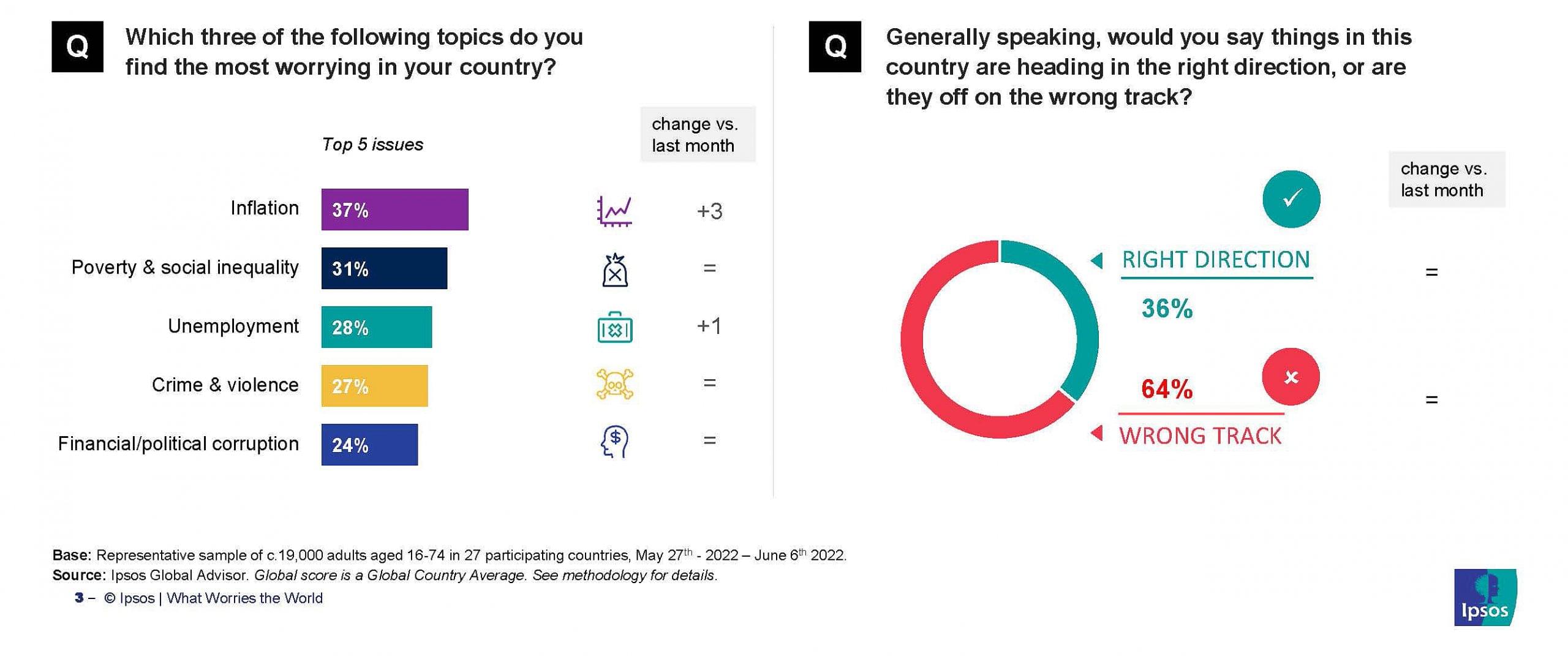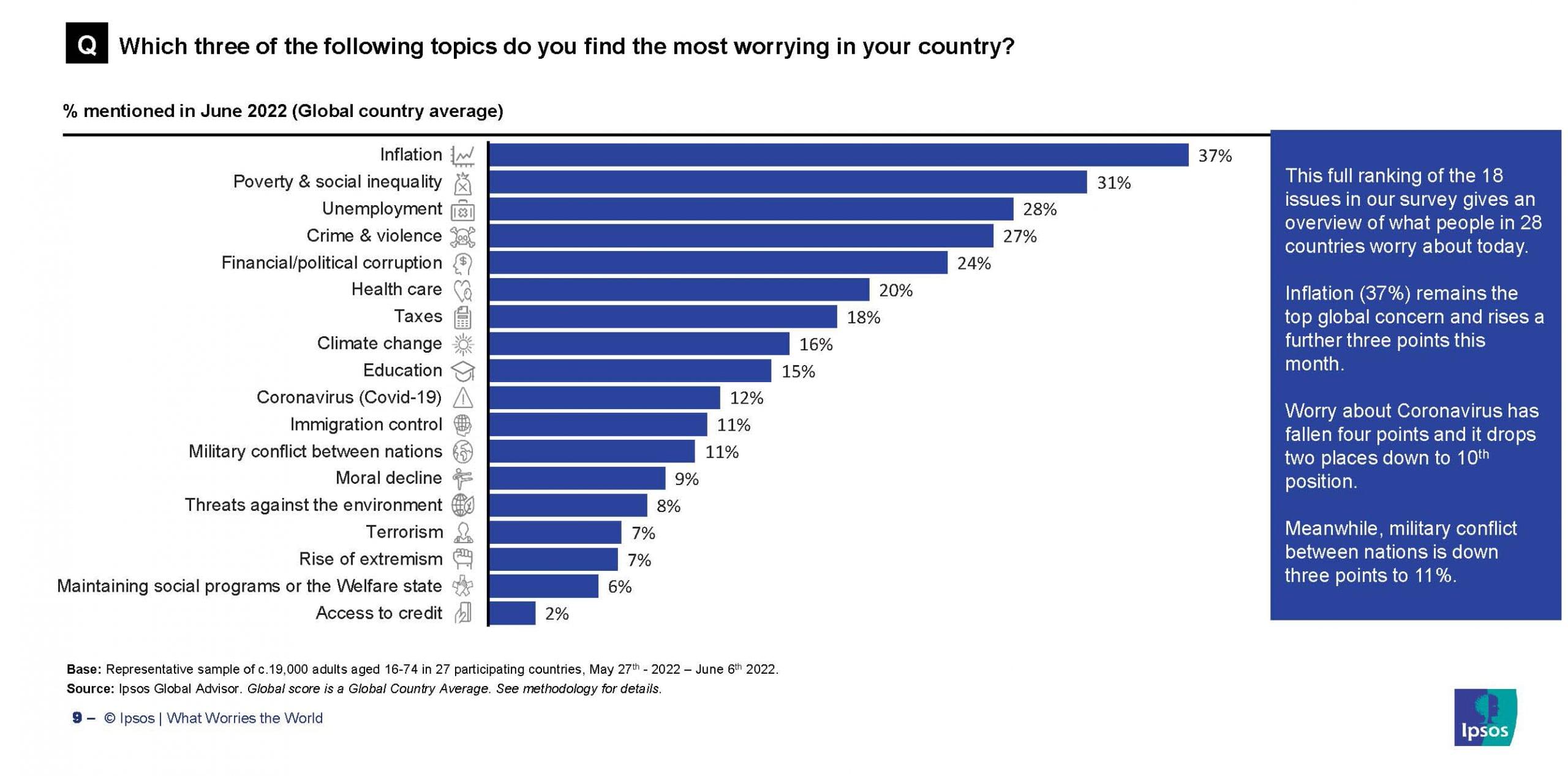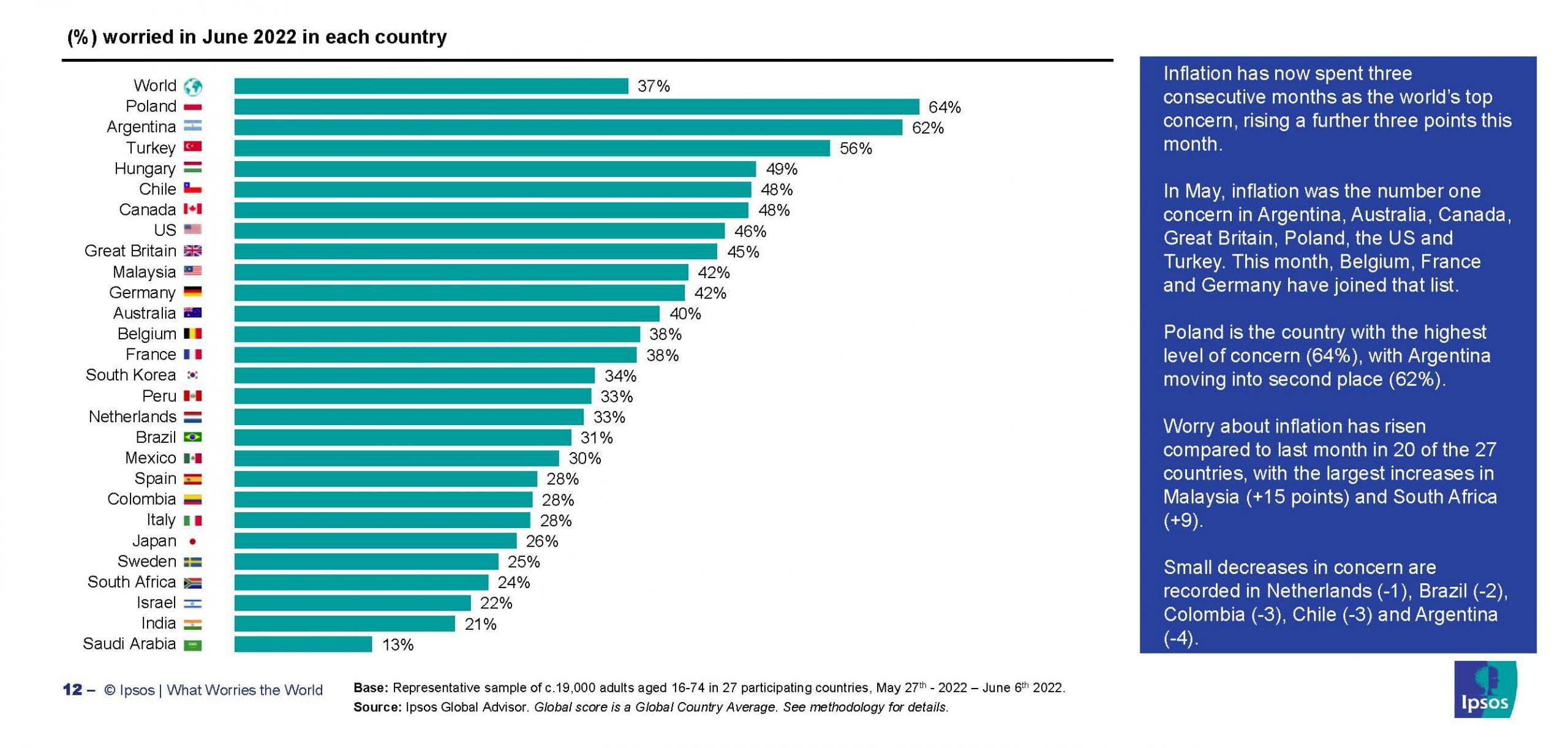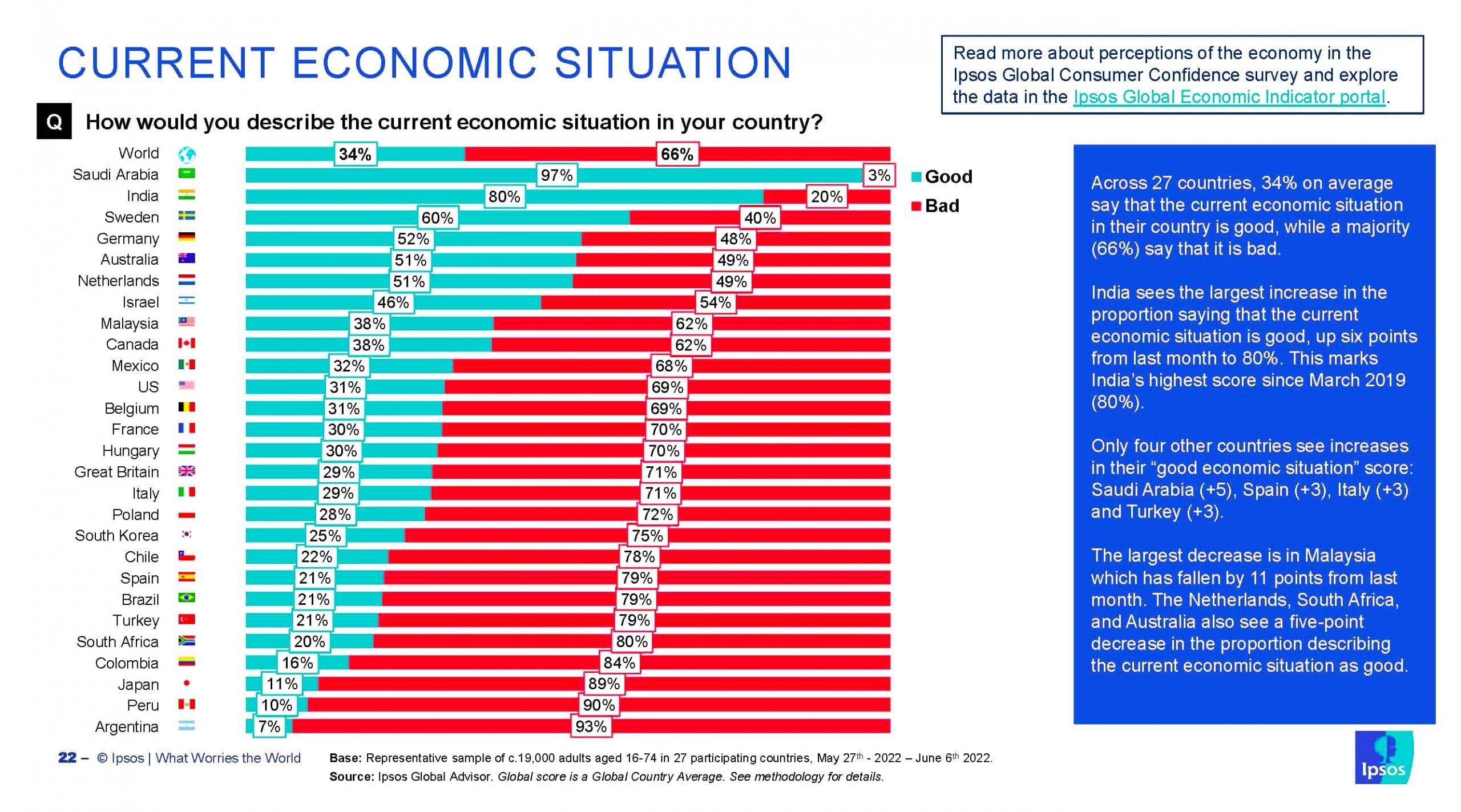People fear inflation the most, globally
Ipsos’ What Worries the World survey tracks public opinion on the most important social and political issues across 27 countries today, drawing on over 10 years of data to place the latest scores in context. This global summary report presents the top concerns around the world, alongside whether people think things in their country are heading in the right or wrong direction.

This global summary report presents the top concerns around the world
This 27-country Global Advisor survey was conducted between May 27th 2022 and June 6th 2022 via the Ipsos Online Panel system among 19,000 adults aged 18-74 in Canada, Israel, Malaysia, South Africa, Turkey and the United States, and 16-74 in all 20 other countries.
The “Global Country Average” reflects the average result for all the countries where the survey was conducted. It has not been adjusted to the population size of each country and is not intended to suggest a total result.

Concerns about inflation has continued to rise in June
Concern about inflation has continued to rise and June marks the third consecutive month where it is a top worry globally. Concern about Coronavirus has continued to decline and, for the first time since its introduction, Covid-19 is not the number one worry for any of the 27 countries surveyed. Meanwhile, two-thirds of people say their country is heading in the wrong direction.
The full ranking of the 18 issues in the survey gives an overview of what people in 28 countries worry about today. Inflation (37%) remains the top global concern and rises a further three points this month. Worry about Coronavirus has fallen four points and it drops two places down to 10th position. Meanwhile, military conflict between nations is down three points to 11%.
Inflation has now spent three consecutive months as the world’s top concern, rising a further three points this month. In May, inflation was the number one concern in Argentina, Australia, Canada, Great Britain, Poland, the US and Turkey. This month, Belgium, France and Germany have joined that list. Poland is the country with the highest level of concern (64%), with Argentina moving into second place (62%). Worry about inflation has risen compared to last month in 20 of the 27 countries, with the largest increases in Malaysia (+15 points) and South Africa (+9). Small decreases in concern are recorded in Netherlands (-1), Brazil (-2), Colombia (-3), Chile (-3) and Argentina (-4).

Worry about poverty and social inequalty is the second largest global concern
Poverty and social inequality is the second largest global concern, with three in ten listing it as a top issue for their country (31%). Hungary is the country where concern is most prevalent (43%), followed by Brazil (42%), the Netherlands (40%), Turkey (39%) and Colombia (38%). Poland sees the largest increase in concern, up seven points from last month, followed by Turkey, up six points. The largest decreases are in France, down five points and Great Britain, Israel and Chile, all down three points Three countries have poverty and social inequality as their top concern: Brazil, Japan, and the Netherlands.
Concern about unemployment has risen by one point in June and it now moves into third place on the list of world worries. Six in ten South Africans list unemployment as a top worry facing their country (63%). Rounding out the top countries most concerned about inflation are Spain (49%), Italy (48%), Colombia (43%), Peru and Mexico (both 41%). Concern has risen most this month in Peru, Hungary and Mexico, all seeing a rise of four points. Meanwhile, concern falls by six points in India. Unemployment is the top concern in seven countries in June: Colombia, India, Saudi Arabia, South Africa, South Korea, Spain and Italy.
More than one in four people globally cite crime and violence as a top issue facing their country (27%), no change from last month. Concern is highest in Mexico (61%), followed by Chile (57%), Sweden (55%), Peru (52%) and South Africa (50%) Following the recent mass shootings, concern about crime and violence has risen by eight points in the US. This is the largest month-on-month increase for this category in June and the US has risen three places in the list of countries concerned. France and Belgium also see significant rises this month, up six and five points respectively. Meanwhile, concern in Israel has fallen 11 points compared to May.

Poland is the country with the highest level of concern (64%) about inflation
Financial or political corruption remains in fifth place in June, with one in four globally listing it as a top issue facing their country (24%). Concern is highest in South Africa where more than one in two people list it as a top issue (55%). Financial or political corruption is also the number one issue in both Peru and Malaysia, where 53% and 50% are concerned about it, respectively. The largest increases in June are in South Africa, Chile and the Netherlands, which all see a four-point increase. Meanwhile, there is a six-point decrease in South Korea.
On average across the 27 countries surveyed, 16% say that climate change is a top issue facing their country, up one point from last month. Concern is highest in Australia, where almost a third of people list it as a top concern (31%). Germany (28%), Canada (24%), Belgium (23%), India (23%) and the Netherlands (23%) follow. The largest month-on-month increases in June are in Spain (up six points) and South Korea and Italy (both up five points). Meanwhile, concern has fallen slightly in the US and Great Britain, both down three points.
Concern about Coronavirus has fallen a further four points this month and it has fallen two places down to 10th on our list of world worries. This month’s score of 12% is its lowest score since it was introduced into the survey in April 2020 and registered 63%. For the first time since its introduction, Covid-19 is not a top worry for any of the 27 countries surveyed. This is despite being the top global worry in February 2022, and the number one worry in 11 countries in January 2022. The largest decreases in June are in Spain (-15), Malaysia (-9) and Canada (-9). Meanwhile, concern has crept back up in the US and Saudi Arabia (both +3).
Military conflict between nations has fallen one place to 12th position this month, with the proportion of people listing it as a top issue facing their country down three points to 11% globally. In Poland and Germany, three in ten list it as a top issue facing their country (33% and 31% respectively). The level of concern has decreased in 19 out of 27 countries this month, and risen marginally in only three: Hungary (+2), Mexico (+1) and Brazil (+1). Three countries see decreases of ten points or more: Belgium (-12), Germany, where it was the top concern last month (-10), and Italy (also -10).

Across 27 countries, a majority (66%) say that current economic situation in his country is bad
Across 27 countries, 34% on average say that the current economic situation in their country is good, while a majority (66%) say that it is bad. India sees the largest increase in the proportion saying that the current economic situation is good, up six points from last month to 80%. This marks India’s highest score since March 2019 (80%). Only four other countries see increases in their “good economic situation” score: Saudi Arabia (+5), Spain (+3), Italy (+3) and Turkey (+3). The largest decrease is in Malaysia which has fallen by 11 points from last month. The Netherlands, South Africa, and Australia also see a five-point decrease in the proportion describing the current economic situation as good.
Related news
Hungarians don’t replace their furniture – JYSK research reveals a conscious, long-term planning market
🎧 Hallgasd a cikket: Lejátszás Szünet Folytatás Leállítás Nyelv: Auto…
Read more >Related news
MOHU: 5,200 return points are in operation, but 47 larger settlements still do not have RE points – public “enema” machines may be introduced
🎧 Hallgasd a cikket: Lejátszás Szünet Folytatás Leállítás Nyelv: Auto…
Read more >GDP growth in OECD member countries slowed to 0.3 percent in the last quarter of last year
🎧 Hallgasd a cikket: Lejátszás Szünet Folytatás Leállítás Nyelv: Auto…
Read more >








